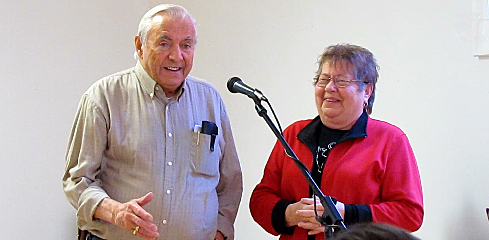Future of health care could be Hospital @ Home
Administrator | Mar 20, 2015 | Comments 1
The future of healthcare could be Hospital @ Home if indicators of success in a pilot project of the Prince Edward County Family Health Team continue.
Hospital @ Home has cared for 129 patients – 29 of which were diverted from a hospital admission by agreeing to participate in the program, saving a total of 287 hospital days.
The program provides a spectrum of services patients would not typically receive from home care, but would have access to in the hospital setting. An overview and details of the pilot were shared at a meeting of interested parties this week in Picton – about one year since the official launch.
“This is a tremendous innovative example of what the future of care could look like in Ontario,” said Stephanie MacLaren, executive director of the Prince Edward Family Health Team. “At a time when ever decreasing hospital budgets are necessitating innovative community based strategies, Hospital @ Home is is stepping up to the plate.”
Saint Elizabeth Health Care, of Markham, has been the primary care provider, to ensure a single care plan, rather than dispersal of care with several groups such as the Red Cross and Paramed who may not cross-communicate.
Admission criteria focuses on the frail elderly, people requiring palliative care, and those with complex medical needs. The most common diagnoses are congestive heart failure, chronic obstructive pulmonary disease (COPD), cancer and diabetes.
And though caregivers must travel instead of treating patients in one place, initial statistics from Queen’s University researchers indicate the plan is not more expensive than treatment in a hospital.
A three-month look at patients admitted to all four Quinte Healthcare Corporation hospitals, with similar ages and treatments as Hospital @ Home patients, showed savings of $311.31 per day – 42.64 per cent less than hospitalization.
Hospital @ Home care at 9.65 days of stay, cost $418.72 per day, a cost per admission of $4,061.78. The QHC control group with a 7.21 day length of stay cost $730.03 per day for a cost per admission of $5,134.38
“At a time when Prince Edward County’s aging demographic is outpacing the Ontario average, Hospital @ Home provides a strong and viable approach that is changing the case of rural healthcare for the better,” said MacLaren.
The program, now in its 18th month of a two-year pilot, said Brad Gunn, PEFHT Nurse Practitioner, only started to realize its potential in October of 2014. “The numbers are pretty much since October. It took time for physicians to be comfortable with admitting patients to the program. Confidence was built first with early discharge patients.”
“We couldn’t be more pleased with the help we had,” said Linda Williamson, wife of Bruce, a Hospital @ Home patient following three weeks of hospitalization in Kingston. “I was worried when he was to come home, about how I was going to do this. But everybody was there the first day to help me get organized, to get him organized.”
“I honestly feel that I wouldn’t be here today if it hadn’t been for these people because they did exceptional work for me,” said Bruce. “If I had stayed in the hospital I don’t think I would be here today because of the care they gave me at home was just unbelievable.”
“I wasn’t worried about anything, but at first, I was scared to death,” said Linda.
“There is no doubt that this kind of program is going to be more needed in the future, not less,” said Katherine Stansfield, QHC chief nursing officer and vice-president of patient services. “We know our population is aging and we know a lot more about how to care for these individuals now than we did five, even 10 years ago…We just need to create more of those kinds of innovations. Wrapping the care around the patient is a principle we need to build on for the future,” she said.
County doctor Graham Burke noted that when patients are moving between the offices, the hospitals and the community there’s always a concern that something will happen and a patient, or a bit of data, will fall through the cracks.
“This is a system that prevents that from happening,” he said. “Surveys around the world ask people about their attitudes toward health care programs. People don’t complain about the care they’re getting, they complain about communication and they complain about attitude. This program allows the communication between the families, doctors and caregivers to be the way it should be.”
Calls of support to continue the program are soon to go out among the partners in the Ministry of Health funded partnership between the PEFHT, the South East Community Care Access Centre, QHC and Saint Elizabeth Healthcare.
Filed Under: Local News
About the Author:


































Good to see you both looking so well.